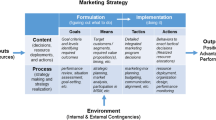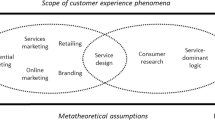Abstract
Contests are a ubiquitous form of promotion widely adopted by financial services advertisers, yet, paradoxically, academic research on them is conspicuous in its absence. This work addresses this gap by developing a model of contest engagement and performance. Using motivation theory, factors that drive participant engagement are modeled, and engagement's effect on experience and marketing success of the contest specified. Measures of contest performance, in-contest engagement and post-contest enduring interest are included. From the model, propositions are developed. Overall, the model provides financial service marketers with a theory-based foundation for designing and operating successful contests.


Similar content being viewed by others
References
Odell, P.E. (2008) PROMO 2008 Industry Trends Report: Promo Lite. PROMO.
Kantar Media. (2011) Kantar Media Reports U.S. Advertising Expenditures Increased 6.4 Percent in the First Nine Months Of 2010.
American General & United States Life 10 for $1000 contest, http://hbwinc.com/event_20091001_10for1000/ ING student essay contest, http://ing.us/about-ing/newsroom/press-releases/ing-names-winners-ing-run-something-better-student-essay-contest-0 IDB Technology in financial service contest, http://www.iadb.org/en/news/announcements/2010-07-29/20-best-winner-ideas-in-a-technology-contest-idb,7590.html.
Phillips, L.E. (2006) Financial Services Online Marketing. eMarketer, p. 23.
Schell, J. (2008) The Art of Game Design: A Book of Lenses. Amsterdam and Boston, MA: Elsevier/Morgan Kaufmann.
Trice, M. (2011) SCVNGR LevelsUp! While McGonigal Fixes Reality. Austin, TX: SXSW.
Ward, J.C. and Hill, R.P. (1991) Designing effective promotional games: Opportunities and problems. Journal of Advertising 20 (3): 69–81.
Deci, E.L. (1975) Intrinsic Motivation. New York: Plenum Press.
Kotler, P. and Keller, K.L. (2006) Marketing Management. Upper Saddle River, NJ: Pearson Prentice Hall.
Stevenson, V.S. (2008) VSS Communications Industry Forecast 2008-2012. New York, NY: Veronis Suhler Stevenson.
Liu, D., Geng, X.J. and Whinston, A.B. (2007) Optimal design of consumer contests. Journal of Marketing 71: 140–155.
Feinman, J., Blashek, R.D. and McCabe, R.J. (1986) Sweepstakes, Prize Promotions, Games, and Contests. Homewood, IL: Dow Jones-Irwin.
Jagoda, D. (2008) Don Jagoda Associates, http://www.dja.com/, accessed 3 December 2008.
Elliott, S. (2008) The $64,000 question: Who wants to be a millionaire? New York Times, 25 November, New York edn.: Section B, 3.
Tedesco, R. (2008) Disney runs dream job contest. PROMO. Penton Media, Online version of Promo Magazine.
Reibstein, D.J. (1982) Factors affecting coupon redemption rates. Journal of Marketing (pre-1986) 46: 102.
Kang, H., Hahn, M., Fortin, D.R., Hyun, Y.J. and Eom, Y. (2006) Effects of perceived behavioral control on the consumer usage intention of e-coupons. Psychology & Marketing 23 (10): 841–864.
Bolton, R.N., Kannan, P.K. and Bramlett, M.D. (2000) Implications of loyalty program membership and service experiences for customer retention and value. Journal of the Academy of Marketing Science 28: 95–108.
Gerstner, E. and Hess, J.D. (1995) Pull promotions and channel coordination. Marketing Science 14 (1): 43.
Chandon, P., Wansink, B. and Laurent, G. (2000) A benefit congruency framework of sales promotion effectiveness. Journal of Marketing 64 (4): 65–81.
Soman, D. (1998) The illusion of delayed incentives: Evaluating future effort – Money transactions. Journal of Marketing Research 35 (4): 427–437.
Moldovanu, B. and Sela, A. (2006) Contest architecture. Journal of Economic Theory 126 (1): 70–96.
Glazer, A. and Hassin, R. (1988) Optimal contests. Economic Inquiry 26 (1): 133–143.
Skaperdas, S. (1996) Contest success functions. Economic Theory 7 (2): 283–290.
Szymanski, S. and Valletti, T.M. (2005) Incentive effects of second prizes next term. European Journal of Political Economy 21 (2): 467–481.
Lynch, J.G. (2005) The effort effects of prizes in the second half of tournaments. Journal of Economic Behavior & Organization 57 (1): 115–129.
Nti, K.O. (2004) Maximum efforts in contests with asymmetric valuations. European Journal of Political Economy 20 (4): 1059–1066.
Trotman, A. and Handley, C. (2008) Programming contest strategy. Computers & Education 50 (3): 821–837.
Thorngate, W., Dawes, R.M. and Foddy, M. (2009) Judging Merit. New York: Psychology Press.
Montaner, T. and Pina, J.-M. (2008) The effect of promotion type and benefit congruency on brand image. Journal of Applied Business Research 24 (3): 15–28.
Simpson, J. (2008) Oxford English Dictionary.
Ryan, R.M. and Deci, E.L. (2000) Intrinsic and extrinsic motivations: Classic definitions and new directions. Contemporary Educational Psychology 25 (1): 54–67.
Deci, E.L. and Ryan, R.M. (2000) The ‘what' and ‘why' of goal pursuits: Human needs and the self-determination of behavior. Psychological Inquiry 11 (4): 227–268.
Vallerand, R.J. (1997) Toward a hierarchical model of intrinsic and extrinsic motivation. Advances in Experimental Social Psychology 29: 271–360.
Nix, G.A., Ryan, R.M., Manly, J.B. and Deci, E.L. (1999) Revitalization through self-regulation: The effects of autonomous and controlled motivation on happiness and vitality. Journal of Experimental Social Psychology 35 (3): 266–284.
Harackiewicz, J.M., Barron, K.E., Tauer, J.M., Carter, S.M. and Elliot, A.J. (2000) Short-term and long-term consequences of achievement goals: Predicting interest and performance over time. Journal of Educational Psychology 92 (2): 316–330.
Amabile, T. (1983) The Social Psychology of Creativity. New York: Springer-Verlag.
Amabile, T.M. (1996) Creativity in Context: Update to the Social Psychology of Creativity. Boulder, CO and Oxford: Westview Press.
Deci, E.L., Vallerand, R.J., Pelletier, L.G. and Ryan, R.M. (1991) Motivation and education – The self-determination perspective. Educational Psychologist 26 (3–4): 325–346.
Harackiewicz, J.M., Abrahams, S. and Wageman, R. (1987) Performance evaluation and intrinsic motivation: The effects of evaluative focus, rewards, and achievement orientation. Journal of Personality and Social Psychology 53 (6): 1015–1023.
Sansone, C. and Smith, J.L. (2000) Interest and self-regulation: The relation between having to and wanting to. In: C. Sansone and J.M. Harackiewicz (eds.) Intrinsic and Extrinsic Motivation: The Search for Optimal Motivation and Performance. San Diego, CA: Academic Press, pp. 341–372.
Deci, E.L. (1971) Effects of externally mediated rewards on intrinsic motivation. Journal of Personality and Social Psychology 18 (1): 105–115.
Lepper, M.R. and Greene, D. (1973) Undermining children's intrinsic interest with extrinsic reward: A test of the “overjustification” hypothesis. Journal of Personality and Social Psychology 28 (1): 129–137.
Kruglanski, A.W., Riter, A., Amitai, A., Margolin, B.S., Shabtai, L. and Zaksh, D. (1975) Can money enhance intrinsic motivation? A test of the content-consequence hypothesis. Journal of Personality and Social Psychology 31 (4): 744–750.
Deci, E.L., Koestner, R. and Ryan, R.M. (1999a) The undermining effect is a reality after all – Extrinsic rewards, task interest, and self-determination: Reply to Eisenberger, Pierce, and Cameron (1999) and Lepper, Henderlong, and Gingras (1999). Psychological Bulletin 125 (6): 692–700.
Deci, E.L., Koestner, R. and Ryan, R.M. (1999b) A meta-analytic review of experiments examining the effects of extrinsic rewards on intrinsic motivation. Psychological Bulletin 125 (6): 627–668.
Deci, E.L. and Ryan, R.M. (1985) Intrinsic Motivation and Self-determination in Human Behavior. New York: Plenum.
Ryan, R.M. and Deci, E.L. (2000) Self-determination theory and the facilitation of intrinsic motivation, social development, and well-being. American Psychologist 25 (1): 68–78.
Dermer, J. (1975) The interrelationship of intrinsic and extrinsic motivation. The Academy of Management Journal 18 (1): 125–129.
Harackiewicz, J.M. and Sansone, C. (1991) Goals and intrinsic motivation: You can get there from here. In: M.L. Maehr and P.R. Pintrich (eds.) Advances in Motivation and Achievement: A Research Annual, Vol. 7. Greenwich, CT: JAI Press, pp. 21–49.
Sansone, C. and Morgan, C. (1992) Intrinsic motivation and education: Competence in context. Motivation and Emotion 16 (3): 249.
Sansone, C., Wiebe, D.J. and Morgan, C. (1999) Self-regulating interest: The moderating role of hardiness and conscientiousness. Journal of Personality 67 (4): 701–733.
Wolters, C.A. (1998) Self-regulated learning and college students’ regulation of motivation. Journal of Educational Psychology 90 (2): 224.
Amabile, T.M., Hill, K.G., Hennessey, B.A. and Tighe, E.M. (1994) The work preference inventory: Assessing intrinsic and extrinsic motivational orientations. Journal of Personality and Social Psychology 66 (5): 950–967.
Vallerand, R.J. and Bissonnette, R. (1992) Intrinsic, extrinsic, and amotivational styles as predictors of behavior – A prospective study. Journal of Personality 60 (3): 599–620.
Tauer, J.M. and Harackiewicz, J.M. (1999) Winning isn’t everything: Competition, achievement orientation, and intrinsic motivation. Journal of Experimental Social Psychology 35 (3): 209–238.
Sansone, C. and Smith, J.L. (2000) The ‘how’ of goal pursuit: Interest and self-regulation. Psychological Inquiry 11 (4): 306.
Sheldon, K.M. and Elliot, A.J. (1999) Goal striving, need satisfaction, and longitudinal well-being: The self-concordance model. Journal of Personality and Social Psychology 76 (3): 482–497.
Sheldon, K.M. and Houser-Marko, L. (2001) Self-concordance, goal attainment, and the pursuit of happiness: Can there be an upward spiral? Journal of Personality and Social Psychology 80 (1): 152.
Krapp, A., Hidi, S. and Renninger, K.A. (1992) Interest, learning, and development. In: K.A. Renninger, S. Hidi and A. Krapp (eds.) The Role of Interest in Learning and Development. Hillsdale, NJ: L. Erlbaum Associates, pp. 3–25.
Zaichkowsky, J.L. (1985) Measuring the involvement construct. The Journal of Consumer Research 12 (3): 341–352.
Author information
Authors and Affiliations
Corresponding author
Additional information
2holds the Clifford F. Youse Chair of Marketing and Strategy at Bentley University. Professor Berthon has held academic positions at Columbia University in the United States, Henley Management College, Cardiff University and University of Bath in the United Kingdom. He has also taught or held visiting positions at Rotterdam School of Management, Copenhagen Business School, Norwegian School of Economics and Management, Cape Town Business School, University of Cape Town and Athens Laboratory of Business Administration. His research focuses on the interaction of technology, corporate strategy and consumer behavior, and has appeared in journals such as Sloan Management Review, California Management Review, Information Systems Research, Journal of Strategic Information Systems, Technological Forecasting and Social Change, Journal of the Academy of Marketing Science, Journal of Business Research, Journal of International Marketing, Long Range Planning, Business Horizons, European Management Journal, Journal of Interactive Marketing, Journal of Information Technology, Information Systems Review, Journal of Business Ethics, Marketing Theory and others.
3holds the Chair of Industrial Marketing at Royal Institute of Technology (KTH) in Sweden and the R&E Lundström Chair of Industrial Marketing at Luleå University of Technology, Sweden where he serves as Associate Professor of e-Commerce and directs the research school of e-Commerce research group. His main teaching and research interests lie in the areas of Industrial marketing, international marketing, e-Commerce and e-Government. He has published in these fields and his articles have appeared in European Journal of Marketing, Industrial marketing Management, Marketing Intelligence and Planning, Technovation, International Journal of Management, Enterprise Information System, International Journal of Enterprise Network Management and others. Dr Salehi-Sangari has also pursued teaching opportunities overseas and has lectured in Ghana, Iran, Japan, Morocco and the United States at the graduate level.
Rights and permissions
About this article
Cite this article
DesAutels, P., Berthon, P. & Salehi-Sangari, E. Rising to the challenge: A model of contest performance. J Financ Serv Mark 16, 263–274 (2011). https://doi.org/10.1057/fsm.2011.18
Received:
Revised:
Published:
Issue Date:
DOI: https://doi.org/10.1057/fsm.2011.18




